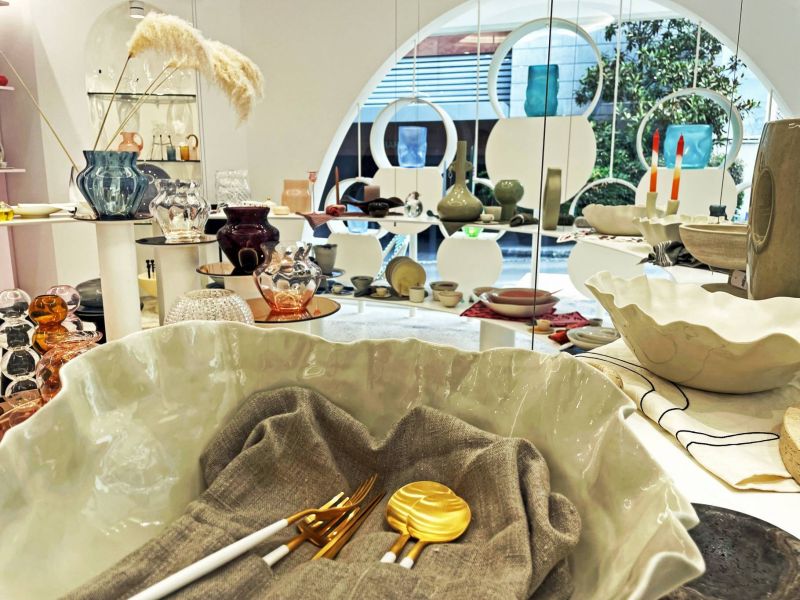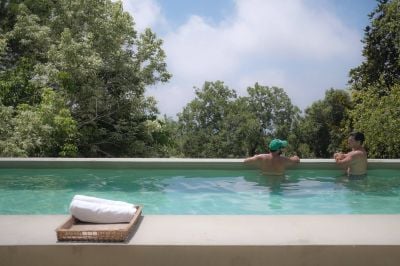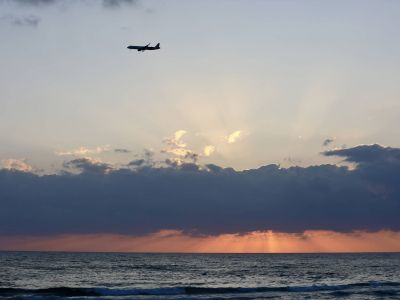
The interior of the Le Huitième home goods store, which opened just before summer this year in Beirut. (Credit: Philippe Hage Boutros/L'Orient-Le Jour)
Lebanon experienced a boom in tourism this summer. According to the latest available figures, nearly 1.1 million visitors were registered by the Tourism Ministry and General Security in June and July — raising the year-by-year seven-month by 23 percent, over 60 percent of which are Lebanese based abroad.
One noticeable boost to business this summer: sales within the luxury retail sector, which had previously been hurt by the economic crisis and COVID-19.
While tourists spent their money in restaurants, beaches, leisure centers and the hospitality sector, shopkeepers also captured a share of this windfall.
“It’s been a good season in terms of business,” Nicolas Chammas, the president of the Beirut Traders Association, told L’Orient-Le Jour. He stated there was an increase in sales of between “10 to 15 percent” compared with last year — an estimate based for the moment on discussions with association members.
Better than expected
Experiencing this hike in sales is Le Huitième, a Beirut luxury home accessories boutique. The retailer, which until now had operated exclusively online, opened a shop in Achrafieh-Tabaris just before the summer.
“We were pleasantly surprised. The results exceeded our expectations,” said Corinne Amatoury, who co-manages the store with her sister.
“We sold expensive and inexpensive products to a clientele that included many Lebanese holidaymakers, as well as Europeans and Americans passing through. It’s all the more pleasing that our shop isn’t even located in Beirut downtown or on a shopping street,” said Amatoury.
Aïshti, a Lebanese distribution group that represents a number of luxury clothing brands — including Prada, Dior and Valentino — experienced a similar spike in sales.
“After a disastrous 2021 and a timid recovery in sales in 2022, this summer’s momentum is promising,” said Aïshti CEO Tony Salameh.
“We are at least halfway to the level of [sales achieved in] 2019, which was a record year, but with proportionately fewer stocks and without tourists from the Gulf, who are known to be major consumers of luxury goods,” he added.
Le Huitième and Aïshti declined to provide figures proving their remarks, while representatives of several luxury brands distributed in Lebanon, including Rolex, Hermès and Chanel also declined to comment.
Lebanon cheaper for luxury
A Beirut-based jeweler, who requested anonymity for personal reasons, painted a more nuanced picture of the situation. “There has been some improvement compared to last year, but it is too early to talk about an upturn, given the current difficulties posed by the business environment,” he said, referring in particular to the 2019 banking crisis.
The jeweler added that it is difficult to identify a consistent trend, given that each jeweler has a different customer base.
He noted a drop in the average sales per customer from $1,500 before the crisis to $500 this summer.
“There were fewer weddings this summer. Many Lebanese people preferred to get married abroad to avoid the exorbitant fees it would have cost them in Lebanon,” he said, pointing to a growing new phenomenon.
“More and more people are buying gold bars directly from local agents who import them, or buying them on the local market, whether the 5-gram ingots at $300 or 1-kilogram ingots worth tens of thousands of dollars. This trend has increased this summer to the point where even the jewelers who go there to buy them have to queue up,” he said.
Those statements are not evidence of an overall economic recovery. However, Lebanon remains a cheaper destination for tourists and expatriates who buy luxury brands.
According to a study carried out a year ago by Global Blue, a Swiss company that provides VAT sales tax refunds for tourists, the price of luxury goods in Lebanon is between two to 25 percent lower than in the United Arab Emirates, Saudi Arabia or Canada, even without VAT refunds. All three countries are home to large Lebanese communities.
The study is based on a sample of 31 branded products — mainly clothing — and indicates that the 15 percent VAT in Saudi Arabia cannot be reclaimed or that duty-free prices in the UAE are too high.
“Lebanon is more expensive than Europe, by 10 to 15 percent, but this trend is reversed with the tax refund,” said a source at Global Blue, who requested anonymity because they are not authorized to speak to the press.
Work in progress and potential
Lebanon is not yet a regional luxury destination.
Global Blue’s subsidiary in Lebanon suspended its duty-free operations in February until the VAT refund system is modified to account for currency instability. However, its operations could resume in the coming weeks.
In other news, three of Beirut’s luxury hotels that closed their doors after the Aug. 4, 2020 blast — Four Seasons, Le Gray and Monroe — have yet to reopen, said Pierre Achkar, president of the Hotel Owners’ Association.
Meanwhile, rows of luxury shops in Beirut’s largely deserted downtown remain shut — for now.
This article was originally published in French in L'Orient-Le Jour. Translation by Joelle El Khoury.

